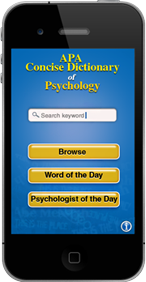Editor Jen Johnson "has a particular interest in helping students craft well-written doctoral research, from the sentence level up." Check out her previous posts, on everything from social change writing to the assumptions in a study.
One App Worth Having: A Review of the APA Concise Dictionary of Psychology App
 |
| Image © APA, 2013 |
When it comes to technology, I am what you might
call old school. For example, while I
started keeping a blog ages ago—way back in 2007—I still get cranky whenever
Blogger decides to “improve” the site and services, because it means I have to
adjust my own familiar, comfortable processes to the changes. And—dare I admit
this?—I just sent my first text message ever about six months ago, using my old
flip-style cell phone, which is almost never on because I never remember to
charge the battery.
I am almost daily made aware of my technological
hang-ups by my husband, who is pretty much the exact opposite of me. While I
typically scorn what I call “bells and whistles” (who needs a GPS device when
you’ve got a real map, after all?), he has a serious appreciation for all the
latest developments. To illustrate: On my husband’s nightstand rests a slim
Kindle e-reader, clad in a leather case; on mine, a stack of no fewer than 10
books, forever in rotation. He once persuaded me to read a screen or two of
text on his Kindle, and while I appreciated its novelty and portability, I am
happy to report that I still prefer the heft and feel of a real book in my
hands over the convenience of a mobile device. Maybe it’s the writer in me, or
the college English major, or the girl who spent all her childhood summers
slouched against the stacks in the local library, but no e-reader will ever
give me the same reading experience as a real, live, honest-to-goodness book.
That said, I’ve recently been convinced that there
are times when the e-version of a book might be just as good, if not better,
than the original print. A case in point: The American Psychological
Association (APA) now offers a mobile version of its 583-page APA Concise Dictionary of Psychology
(APA, 2008). When I heard about this app, I borrowed my husband’s smartphone to
investigate. Here’s what I discovered: At $30, the app is slightly less
expensive than the print version of the dictionary, but with the same content
of more than 10,000 definitions and with a few capabilities that the print
version cannot offer. For example, the app allows the user to search by keyword
or to simply browse terms, and it offers links to other terms within
definitions. To experiment, I searched for Freud
and got the result Freudian slip, the
definition for which provided a link to the phrase slip of the tongue, which led me to the term spoonerism. In addition to these basic search and browse functions,
the app provides search history and the ability to add notes about definitions
and mark terms as favorites. It also offers the Historical Figures in
Psychology listing available in the print version, along with other features
unique to the app version, including Word of the Day and Psychologist of the
Day (I got cocaine dependence and Lev Vygotsky one day, resolution and John Hughlings Jackson the next).
In sum, this app may be a good resource for students
who like the convenience of having a reference work readily available on their
mobile phone, without the need to tote around a 2-pound text. And if you’re
like me, an added bonus is the extra room the app leaves in your book bag for
those treasured books you cannot bear to read in any other form.
A final note: If you are interested in the app
version of the dictionary, know that you will need to buy the full version; the
free trial version is little more than a teaser, offering a limited selection
of terms and no access to the Word of the Day, Psychologist of the Day, and
other special features.
For more information about both the print and mobile
version of the APA Concise Dictionary of
Psychology, visit APA's website.
Subscribe to:
Post Comments
(
Atom
)




No comments :
Post a Comment